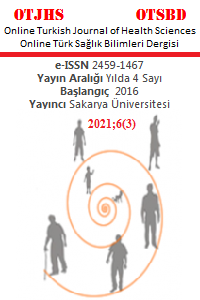Research Article
Enürezis Nokturnalı Çocuklarda Başvuru Yaşını Etkileyen Faktörler: Türkiye’nin Doğusundan Multisentrik Çalışma
Abstract
Amaç: Çocukluk çağında sık görülen enürezis nokturna tedavi edilmez ise önemli psikososyal sorunlara neden olabilir. Bu çalışmada enürezis nokturnalı çocukların polikliniğe başvuru yaşını etkileyen faktörlerin incelenmesi amaçlandı.
Materyal ve Metot: Çalışmaya beş ayrı merkezden hastalar dahil edildi. Hastaların yaşı, cinsiyeti, aile yapısı, yaşadıkları yer, annenin mesleki durumu, ebeveynlerin eğitim düzeyi ve gelir durumları hastane kayıtlarından ve telefonla ailelere ulaşılarak öğrenildi.
Bulgular: Çalışmaya dahil edilen 162 hastanın ortalama yaşı 9,41±3,24 yıl olup, 94’ü erkekti. Ebeveynlerinin eğitim düzeyi ve gelir düzeyi arttıkça hastaların polikliniğe başvuru yaşının anlamlı bir şekilde azaldığı tespit edildi. Ayrıca kentsel bölgede yaşayan hastaların kırsala nazaran daha erken dönemde hastaneye başvurdukları görüldü.
Sonuç: Ebeveynlerin eğitim düzeyi, yerleşim yeri ve gelir düzeyi gibi faktörler enürezis nokturnalı hastaların polikliniğe başvuru zamanı açısından önemlidir.
Keywords
References
- Doganer YC, Aydogan U, Ongel K et al. The prevalence and sociodemographic risk factors of enuresis nocturna among elementary school-age children. J Family Med and Primary Care. 2015;4(1):39. doi:10.4103/2249-4863.152250
- Arda E, Cakiroglu B, Thomas, DT. (2016). Primary nocturnal enuresis: a review. Nephro-urology monthly. 2016; 8(4): 1-6. doi: 10.5812/numonthly.35809
- Penbegül N, Çelik H, Palancı Y et al. Prevalence of enuresis nocturna among a group of primary school children living in Diyarbakır. Turk J Urol. 2013;39(2):101-105. doi:10.5152/tud.2013.021
- Tai TT, Tai BT, Chang YJ, et al. Parental perception and factors associated with treatment strategies for primary nocturnal enuresis. J Pediatr Urol. 2017;13:1-8. doi:10.1016/j.jpurol.2016.12.025
- Bilal M, Haseeb A, Saeed A, et al. Prevalence of nocturnal enuresis among children dwelling in rural areas of sindh. Cureus. 2020;12:9590 doi:10.7759/cureus.9590
- Yanli MA, Ying SHEN, Xiaomei LIU. Self-Concept in Children with Primary Nocturnal Enuresis and Related Influencing Factors. Iranian journal of public health. 2020; 49(4): 805-807.
- Basiri A, Bahrainian SA, Khoshdel A, et al. Primary nocturnal enuresis is associated with lower intelligence quotient scores in boys from poorer socioeconomic status families. International Journal of Urology. 2017;24(3): 217-221. doi:10.1111/iju.13282
- Zhang A, Li S, Zhang Y, et al. Nocturnal enuresis in obese children: a nation-wide epidemiological study from China. Scientific reports. 2019; 9(1): 1-8. doi:10.1038/s41598-019-44532-5
Factors Affecting the Age of Application in Children with Enuresis Nocturnal: A Multicentric Study from the Eastern of Turkey
Abstract
Objective: Enuresis nocturna, which is common in childhood, can cause significant psychosocial problems if left untreated. In this study, it was aimed to examine the factors affecting the age of admission to the outpatient clinic in children with enuresis nocturna.
Materials and Methods: Patients from five different centers were included in the study. The patients' age, gender, family structure, place of residence, occupational status of the mother, education level and income of the parents were obtained from the hospital records and by contacting the families by phone.
Results: The mean age of the 162 patients included in the study was 9.41±3.24 years, 94 of whom were male. It was found that as the education level and income level of their parents increased, the age of referring to the polyclinic decreased significantly. In addition, it was observed that patients living in urban areas applied to the hospital earlier than rural patients.
Conclusion: Factors such as the education level of the parents, place of residence and income level are important in terms of the time of admission to the outpatient clinic of patients with enuresis nocturna.
Keywords
References
- Doganer YC, Aydogan U, Ongel K et al. The prevalence and sociodemographic risk factors of enuresis nocturna among elementary school-age children. J Family Med and Primary Care. 2015;4(1):39. doi:10.4103/2249-4863.152250
- Arda E, Cakiroglu B, Thomas, DT. (2016). Primary nocturnal enuresis: a review. Nephro-urology monthly. 2016; 8(4): 1-6. doi: 10.5812/numonthly.35809
- Penbegül N, Çelik H, Palancı Y et al. Prevalence of enuresis nocturna among a group of primary school children living in Diyarbakır. Turk J Urol. 2013;39(2):101-105. doi:10.5152/tud.2013.021
- Tai TT, Tai BT, Chang YJ, et al. Parental perception and factors associated with treatment strategies for primary nocturnal enuresis. J Pediatr Urol. 2017;13:1-8. doi:10.1016/j.jpurol.2016.12.025
- Bilal M, Haseeb A, Saeed A, et al. Prevalence of nocturnal enuresis among children dwelling in rural areas of sindh. Cureus. 2020;12:9590 doi:10.7759/cureus.9590
- Yanli MA, Ying SHEN, Xiaomei LIU. Self-Concept in Children with Primary Nocturnal Enuresis and Related Influencing Factors. Iranian journal of public health. 2020; 49(4): 805-807.
- Basiri A, Bahrainian SA, Khoshdel A, et al. Primary nocturnal enuresis is associated with lower intelligence quotient scores in boys from poorer socioeconomic status families. International Journal of Urology. 2017;24(3): 217-221. doi:10.1111/iju.13282
- Zhang A, Li S, Zhang Y, et al. Nocturnal enuresis in obese children: a nation-wide epidemiological study from China. Scientific reports. 2019; 9(1): 1-8. doi:10.1038/s41598-019-44532-5
There are 8 citations in total.
Details
| Primary Language | English |
|---|---|
| Subjects | Health Care Administration |
| Journal Section | Research article |
| Authors | |
| Publication Date | September 5, 2021 |
| Submission Date | May 31, 2021 |
| Acceptance Date | June 23, 2021 |
| Published in Issue | Year 2021 Volume: 6 Issue: 3 |
Online Türk Sağlık Bilimleri Dergisi [Online Turkish Journal of Health Sciences (OTJHS)] is licensed under a Creative Commons Attribution-NonCommercial 4.0 International License.
This is an open-access journal distributed under the terms of the Creative Commons Attribution License (CC BY-NC 4.0). The use, distribution or reproduction in other forums is permitted, provided the original author(s) or licensor are credited and that the original publication in this journal is cited, in accordance with accepted academic practice. No use, distribution or reproduction is permitted which does not comply with these terms.
Click here to get help about article submission processes and "Copyright Transfer Form".



